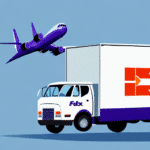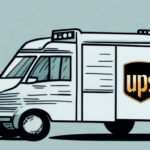Understanding the UPS Ancillary Clearance Service Fee
As a business owner, comprehending all fees associated with shipping is crucial for reducing costs and enhancing profitability. One such fee that many businesses encounter when shipping internationally is the UPS Ancillary Clearance Service Fee. This article provides an in-depth analysis of what this fee entails, how it is calculated, why it is necessary, and strategies to avoid paying it.
What is the UPS Ancillary Clearance Service Fee?
The UPS Ancillary Clearance Service Fee is a charge imposed on shipments requiring additional customs clearance beyond UPS's standard service offerings. This fee covers the extra time, administrative work, and resources necessary to ensure your shipment successfully navigates customs and crosses international borders.
It's important to note that this fee is distinct from customs duties or taxes. Instead, it is a service fee charged by UPS based on the value of the goods being shipped and the complexity of the customs process.
Businesses can avoid this fee by ensuring all customs documentation is complete and accurate and by selecting a UPS service level that includes basic customs clearance. However, if a shipment requires additional clearance, the fee will be applied.
How is the UPS Ancillary Clearance Service Fee Calculated?
The UPS Ancillary Clearance Service Fee is primarily based on the value of the goods being shipped and the country of origin. Typically, the fee is calculated as a percentage of the customs value of the shipment, with a minimum charge of $5.50 USD. Complex shipments or those needing extra documentation or handling may incur higher fees.
It's essential to recognize that this fee is separate from any duties or taxes levied by the destination country, which are the recipient's responsibility. To avoid unexpected costs or delays, businesses should research the customs regulations of the destination country prior to shipping.
For assistance with customs documentation and fee calculations, UPS offers various services, including customs brokerage, duty and tax calculation, and compliance assistance. Utilizing these services can help ensure smooth and cost-effective shipments.
Why is the UPS Ancillary Clearance Service Fee Necessary?
Shipping internationally involves navigating complex customs processes. Without the UPS Ancillary Clearance Service, businesses would need to manage customs clearance themselves, which can be time-consuming and challenging.
By paying this fee, businesses leverage UPS's expertise in customs clearance, ensuring shipments clear customs swiftly and efficiently. Additionally, the fee grants access to UPS’s advanced technology and software, which aids in identifying and resolving potential shipment issues before they cause delays.
Moreover, utilizing UPS's service ensures compliance with all relevant laws and regulations, minimizing the risk of fines and penalties associated with non-compliance.
The Impact of the UPS Ancillary Clearance Service Fee on Shipping Costs
The UPS Ancillary Clearance Service Fee can significantly affect overall shipping costs, especially for high-value items. However, avoiding this fee might lead to delays, lost packages, and additional unforeseen costs. Investing in the fee upfront can mitigate these risks and promote successful customs clearance.
In addition to direct costs, delays caused by customs issues can impact customer satisfaction and business reputation. Ensuring timely and reliable shipment delivery by paying the Ancillary Clearance Service Fee helps maintain positive customer relationships and supports long-term business success.
Businesses should also account for other potential international shipping fees, such as duties and taxes. Collaborating with trusted shipping partners can help navigate these complexities and optimize shipping budgets.
How to Avoid Paying the UPS Ancillary Clearance Service Fee
To avoid the UPS Ancillary Clearance Service Fee, businesses should aim to simplify their shipments. This includes:
- Completing all necessary documentation: Ensure all customs forms and required documents are accurately filled out.
- Avoiding high-value or complex items: Shipping items with lower values or simpler customs requirements reduces the likelihood of incurring additional fees.
Another effective strategy is to employ a customs broker. Customs brokers manage the customs clearance process, ensuring all documentation is in order and handling any complexities, which can prevent unexpected fees and delays. While this service may involve additional costs, it can result in overall savings by avoiding complications.
The Benefits of Using the UPS Ancillary Clearance Service
Despite appearing as an extra expense, the UPS Ancillary Clearance Service Fee offers numerous benefits:
- Expertise in Customs Clearance: UPS handles the complexities of customs regulations, reducing the risk of errors and delays.
- Advanced Tracking and Technology: Real-time tracking and advanced software help monitor shipments and proactively address potential issues.
- Compliance Assurance: Ensures shipments meet all legal requirements, minimizing the risk of fines and penalties.
- Personalized Support: Access to UPS’s support team for guidance and assistance throughout the shipping process.
These advantages contribute to smoother shipping operations and can ultimately lead to cost savings and enhanced customer satisfaction.
Common Misconceptions about the UPS Ancillary Clearance Service Fee
There are several misconceptions surrounding the UPS Ancillary Clearance Service Fee:
- Unnecessary Expense: Some believe the fee is avoidable, but it is essential for ensuring efficient customs clearance and avoiding larger costs related to delays or lost shipments.
- Only for International Shipments: While primarily associated with international shipping, the fee can also apply to certain domestic shipments that require additional clearance.
- Confusion with Duties and Taxes: The service fee is separate from customs duties and taxes, which are determined by the destination country and the type of goods shipped.
Understanding these distinctions is crucial for accurate cost assessment and effective shipping strategies.
How to Dispute a Charge for the UPS Ancillary Clearance Service Fee
If you believe you have been incorrectly charged the UPS Ancillary Clearance Service Fee, follow these steps to dispute the charge:
- Contact UPS Customer Service: Reach out to UPS with your tracking number and invoice details to discuss the charge.
- Provide Documentation: Have all relevant shipment and billing documents ready to support your case.
- Escalate if Necessary: If the issue isn't resolved, consider escalating the dispute through your credit card company or bank, providing all necessary evidence.
Maintaining clear communication and having detailed records will facilitate the dispute resolution process.
Alternatives to Using the UPS Ancillary Clearance Service
Businesses seeking alternatives to the UPS Ancillary Clearance Service have several options:
- Self-Handling Customs Clearance: Managing the customs process independently, though this can be time-consuming and complex.
- Third-Party Logistics Providers: Engaging third-party logistics companies specializing in customs clearance and international shipping.
- Freight Forwarders: Utilizing freight forwarders to coordinate shipments, handle logistics, and manage customs requirements.
Each alternative comes with its own set of benefits and potential costs. It's essential to evaluate which option best aligns with your business needs and shipping volume.
Ultimately, the UPS Ancillary Clearance Service Fee plays a vital role in international shipping by ensuring efficient and compliant customs clearance. Understanding its implications and exploring available alternatives can help businesses make informed decisions and optimize their shipping operations.






















